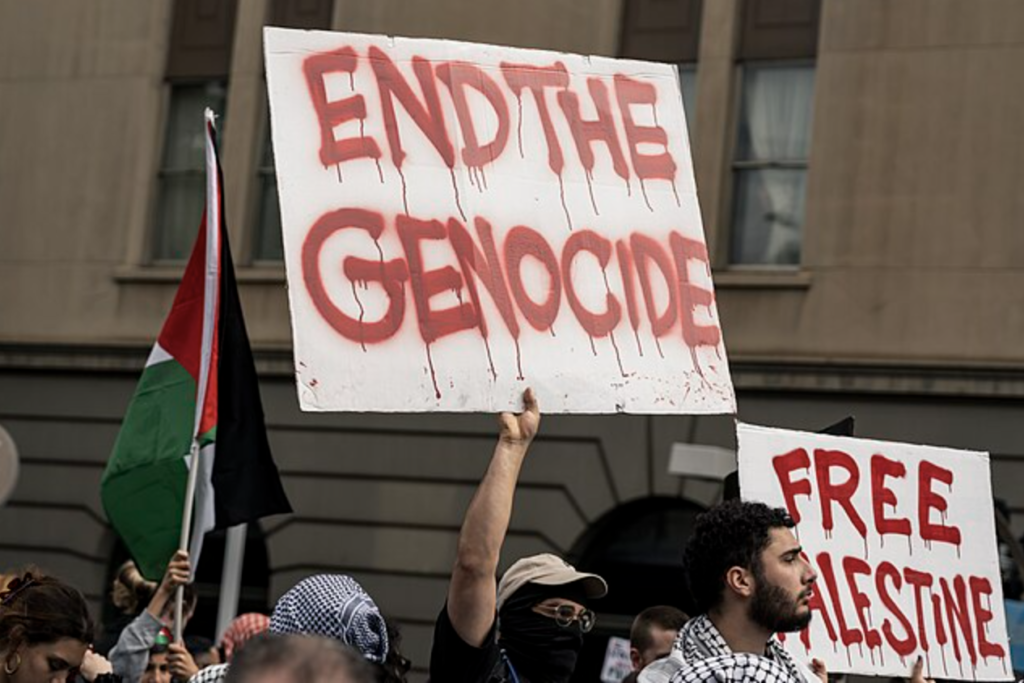Middle East Tension: Israel’s Escalation Could Lead to Regional War

By: Ghassan Rubeiz / Arab America Contributing Writer
As the Gaza war drags on, the chances of military escalation are increasing. Arabs and Jews living between the River and the Sea share an environment of profound fear and deep anger. When people experience anger for the loss of their land, mixed with fear of death or displacement, they tend to develop a visceral hate of the perceived adversary.
They get overwhelmed by a rush to kill the source of the threat at any cost. The urge to destroy is numbing. The sensation of remorse is lost; guilt is suppressed. In varying degrees, many on both sides of the conflict have developed the urge to kill or displace, losing the moral faculty of resistance to unacceptable behavior. We saw that urge at play in Hamas’ horrific attacks on October 7, and we have been witnessing the same urge in the behavior of the IDF over the past six months.
It is as if Palestinians and Israelis are in a constant state of road rage: one might say living in the Holy Land is like driving on a highway with no traffic rules. It is a stew of hate, fear, and anger. After a recent visit to Israel, Washington Post’s Ruth Marcus described an unbearable, existential mood of loneliness among Israelis who process the October 7 experience as a one-day Holocaust. But Marcus did not comment on a reciprocal sentiment among Palestinians, who have felt abandoned by the world community for decades.
Last week, on April 1, Israel surprised us with two separate acts of escalation. An Israeli airstrike in Gaza killed a convoy of seven [six Westerners and one Palestinian] World Central Kitchen workers. On the same day, an Israeli airstrike on Iran’s consulate in Damascus killed several Iranians, including two high-ranking commanders of the Islamic Revolutionary Guard Corps. The aid workers were assigned to deliver food to a starving population.
The attack on an Iranian diplomatic site is unprecedented; this reckless incident will likely elicit severe retaliation from Iran. The killing of a dedicated team of foreign workers serving under challenging conditions may have received more attention from Western media than the assassination of Iranian military leaders. Nevertheless, attacking a consulate is an act of war. The attack on the diplomatic site destroyed the building and killed over a dozen Iranians and Syrians. Whereas the attack on the embassy was a deliberate assassination, the bombing of Gaza aid workers could theoretically have been accidental.
These two developments occurred against a general Israeli plan to accelerate and expand the scope of military action. Compensating for its failure in Gaza, Israel plans to launch a ground offensive in Rafah, Gaza’s largest tent city, to escalate the fighting with Hezbollah in south Lebanon and to continue its deadly campaign against Iran’s Revolutionary Guard Corps in Syria. At the eleventh hour, will Israel heed the repeated warnings of Washington to spare Rafah?
The debate about killing aid workers
Last week’s loss of life among aid workers was not a rare occurrence. About 200 aid personnel have died in Gaza since the IDF started its war in the Strip. The Western media’s debate over the attack on the staff of the World Central Kitchen (WCK) focused on the question of intention: was it a deliberate attack? Accidental or not, the atrocity against WCK was committed in an accident-prone war environment where the rules of combat are all too lax. Israel’s military has failed to discriminate between combatants and civilians. This war has injured and killed over a hundred thousand people, displaced and starved an entire population, and severely curtailed access to food, medicine, and water. An urge for revenge drives Israel’s military; its soldiers are morally supported by a population that is seething for retribution against Hamas and the entire population of Gaza.
Biden acted decisively for a change
President Biden was shocked to learn about the WCK incident; he expressed his anger with strong words and a warning to Prime Minister Netanyahu. Biden threatened that if Israel does not make concrete and measurable improvements in reducing civilian casualties and increasing aid, he would start conditioning US military assistance to Israel. Within twenty-four hours, the White House learned that Israel had opened the Erez Crossing at the northern tip of Gaza to allow in more humanitarian aid. In addition, Netanyahu ordered Israel’s Ashdod port to serve ships carrying material assistance to Gaza. Biden seems pleased with himself for taking action to shape Israel’s behavior.
Netanyahu may be trying to improve his position by deliberately provoking a regional war with Iran. While Biden’s discussion with Netanyahu about Israel’s attack on the Iranian consulate was confidential, it is clear that Biden is ready to defend Israel if Iran retaliates beyond expectations. Iran considers Israel’s latest attack a humiliating act of escalation. If Iran and Hezbollah are drawn to a regional war with Israel, the US will feel obligated to join such a regional conflagration. In an opinion piece, the Middle East Eye asserts that Israel’s air strike on the consulate could draw the US into the war: “But Monday’s strike marks a serious escalation, risking confrontation between Israel and Iran that could draw in the US. Having directly blamed Israel for the attack, which reduced its consulate to rubble, Iran will be pressured to respond. Iran says Israel is behind deadly strikes on its consulate in Damascus.
In such a regional war with Iran, it would be difficult for Biden to maintain the pressure on Israel’s current war cabinet. University of Michigan History Professor Juan Cole even speculates that Netanyahu’s recent attack on Iran’s consulate might have been a desperate move to draw Iran into a regional war. If Iran retaliates directly, Cole hypothesizes, the Biden administration will feel the need to come to Israel’s aid. Provoking an Iranian assault might be the best way for Netanyahu to outflank an increasingly critical US government.
Netanyahu is taking full advantage of the built-in inconsistencies in US policy toward Israel. The US has supported Israel’s occupation for 56 years but is now also telling Jerusalem to plan for a two-state solution. Concerning the war, the US stance is effective: “Do whatever it takes to defeat Hamas… but be careful not to kill too many Palestinians.” This dissonance is prolonging and expanding the Gaza war, delaying the return of hostages, and preventing the search for a realistic solution to the Arab-Israeli conflict.
Ghassan Rubeiz is the former Middle East Secretary of the World Council of Churches. Earlier he taught psychology and social work in his country of birth, Lebanon, and later in the United States, where he currently lives. For the past twenty years, he has contributed to political commentary and delivered occasional public talks on subjects related to peace, justice, and interfaith. You can reach him at rubeizg@gmail.com
The views and opinions expressed in this article are those of the author and do not necessarily reflect the position of Arab America. The reproduction of this article is permissible with proper credit to Arab America and the author.
Check out our Blog here!









